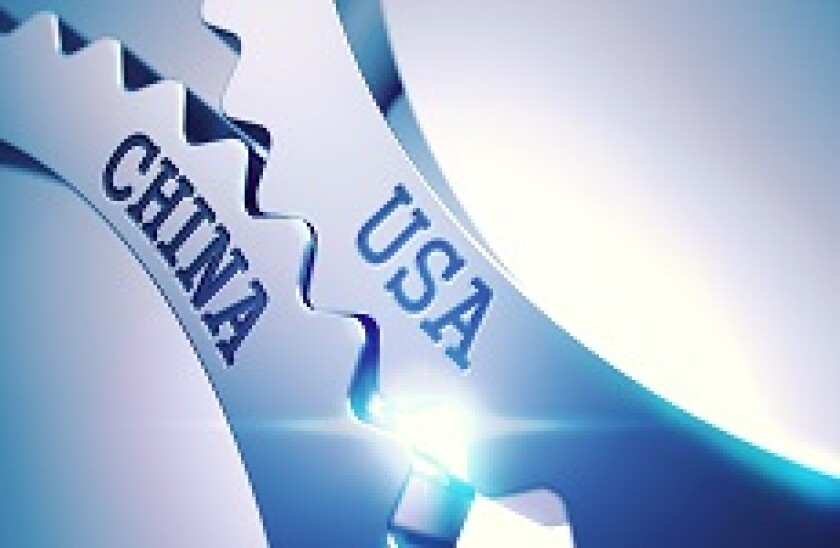China and the US have agreed on the text of a phase one trade deal after months of negotiations, China announced in a joint press conference held by the Ministry of Agriculture, Ministry of Commerce, Ministry of Foreign Affairs and the National Development and Reform Commission at 11pm local time last Friday.
“The phase one deal includes nine chapters — prelude, intellectual properties, technology transfer, food and agricultural products, financial services, FX and transparency, trade expansion, mutual evaluation and solutions, and concluding terms,” Wang Shouwen, vice minister of commerce, said in the conference.
“The agreement generally agrees with China’s own general policy direction of deepening reform and opening up,” Wang added. “It will also facilitate the country’s domestic need for facilitating high-quality economic developments.”
US president Donald Trump has not yet signed the deal, the official statement from China shows. The next steps in the negotiation will be reviewing the deal from a legal point of view, translating and proofreading and arranging the final signing details.
Both the US and China will suspend any tariffs escalations for now. The 25% tariffs that were set to take effect on December 15 were cancelled.
The Chinese side did not disclose any details of the deal. But according to the Wall Street Journal, China agreed to import $50bn of farm goods from the US annually, citing Michael Pillsbury, an adviser to the US president. China also agreed to tighten intellectual property protection and open up its financial services market to US companies, the report added. The US, on the other hand, has agreed to refrain from imposing new tariffs on Chinese goods and partially roll back the existing tariffs on $360bn of Chinese goods in phases. The two countries also agreed that tariffs can be reapplied if China does not live up to its obligations.
The $50bn farm goods import is a big step for China. From 2015 to 2017, China’s average annual imports of agricultural goods from the US was only $24.2bn. In 2018, imports declined to $16.2bn. In the first 10 months this year, that number was only $10.4bn, Han Jun, vice minister of agriculture, said in the press conference.
But the numbers are likely inaccurate. Trump called the Wall Street Journal story fake news. “The Wall Street Journal story on the China Deal is completely wrong, especially their statement on Tariffs,” the president tweeted on Friday evening without specifying which story he was referring to.
Just about 25 minutes into the press conference in Beijing, Trump tweeted: “We have agreed to a very large Phase One Deal with China. They have agreed to many structural changes and massive purchases of Agricultural Product, Energy, and Manufactured Goods, plus much more. The 25% Tariffs will remain as is, with 7 1/2% put on much of the remainder.”
He also said that the negotiations on the phase two deal will begin immediately rather than after the 2020 election.
The phase one deal will nearly double US exports to China over the next two years, Robert Lighthizer, US trade representative, said on the CBS’ Face the National programme on Sunday.
*
China’s industrial production rose by 6.2% year-on-year in November from 4.7% in October, according to data published by the National Bureau of Statistics on Monday morning. Retail sales expanded by 8% year-on-year last month from 7.2% in October.
Both growth numbers were higher than market expectations, Maggie Wei, a China economist at Goldman Sachs, wrote in a Monday note.
*
The PBoC will issue Rmb10bn of six-month bills in Hong Kong through the Hong Kong Monetary Authority’s Central Moneymarkets Unit on December 20, according to a press release on Monday by the HKMA.
*
US-based asset manager Vanguard and China-based Ant Financial Services Group have formed a joint venture to bring new investment advisory service to retail consumers in China, according to a Monday announcement. The China Securities Regulatory Commission (CSRC) has already approved the partnership.
The joint venture will provide customised services for investors and will be accessible through Alipay and Ant Fortune. The latter is a wealth management platform operated by Ant Financial.
Previously, professional investment advisory services were only accessible to a small number of high-net-worth individuals in China, according to the announcement.
*
By November, foreign corporations invested Rmb845.9bn of new money into China, a 6% year-on-year increase, the Ministry of Commerce announced last Friday.
The high-tech industry recorded Rmb240.7bn of foreign investment in the first 11 months, taking up 28.5% of the overall foreign investments. That marked a 27.6% year-on-year increase.

